-
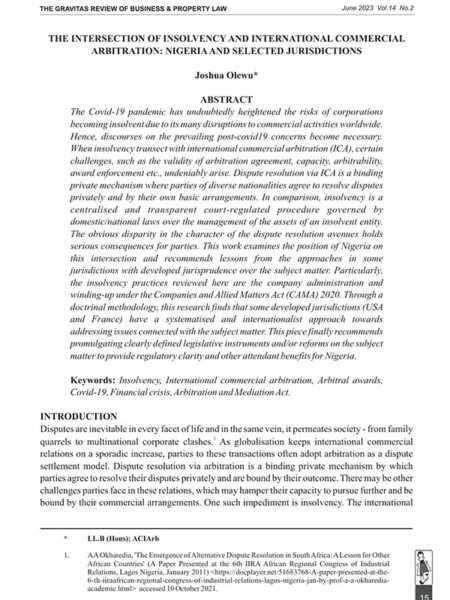
The Intersection of Insolvency and International Commercial Arbitration Nigeria and Selected Jurisdictions
0₦2,500.00Joshua Olewu in his article, The Intersection of Insolvency and International Commercial Arbitration: Nigeria and Selected Jurisdictions, examines the challenges posed by the intersection of insolvency with international commercial arbitration (ICA), such as validity of arbitration agreement, capacity, arbitrability, award enforcement etc,. He examines the position of Nigeria on this intersection and recommends lessons from the approaches in some jurisdictions with developed jurisprudence over the subject matter. Olewu, finds through a doctrinal methodology, that some developed jurisdictions (USA and France) have a systematized and internationalist approach towards addressing issues connected with the subject matter and recommends for Nigeria, the promulgation of clearly defined legislative instruments and/or reforms in order to provide regulatory clarity and other attendant benefits.
-
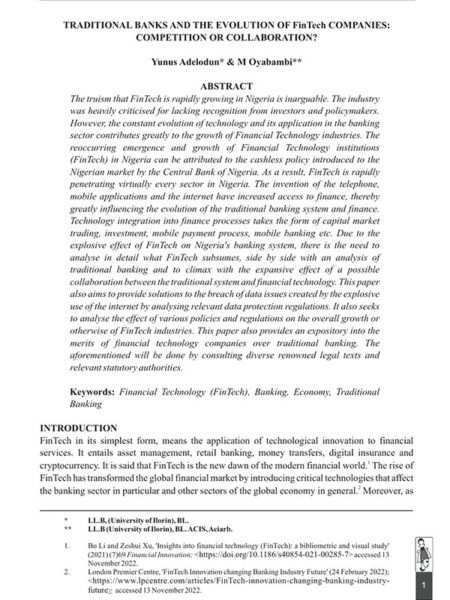
Traditional Banks and the Evolution of Fintech Companies: Competition or Collaboration?
0₦2,500.00Yunus Adelodun and M. Oyabambi in their article, Traditional Banks and the Evolution of Fintech Companies: Competition or Collaboration? examine the growing recognition of Fintechs, their technology and its application in the banking sector. They analyze in details what Fintech subsumes, side by side an analysis of traditional banking and climaxed with the expansive effect of a possible collaboration between the traditional system and financial technology. They provide solutions to the breach of data issues created by the explosive use of the internet, by providing an analysis of relevant data protection regulations. They also provide an expository into the merits of financial technology companies over traditional banking.
-
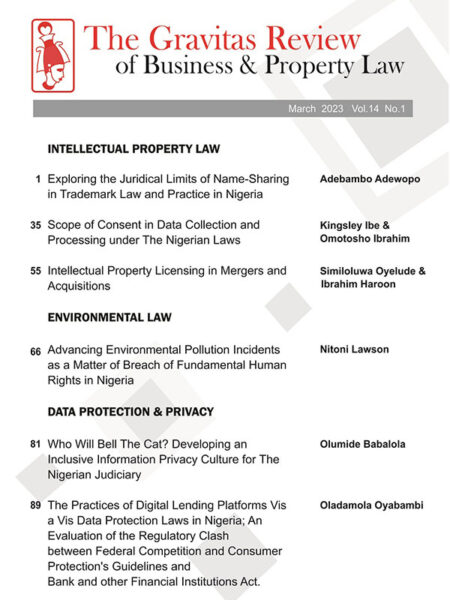
The Gravitas Review of Business & Property Law Vol.14 No.1 – Print
0₦5,000.00In this issue of The Gravitas Review of Business & Property Law Vol.14 No.1, there are well researched articles on:
- Intellectual Property Law
- Environmental Law
- Data Protection & Privacy
-

The Gravitas Review of Business & Property Law Vol.14 No.1 – E-Book
0₦5,000.00In this issue of The Gravitas Review of Business & Property Law Vol.14 No.1, there are well researched articles on:
- Intellectual Property Law
- Environmental Law
- Data Protection & Privacy
-

The Gravitas Review of Business & Property Law Vol.14 No.1
0₦5,000.00In this issue of The Gravitas Review of Business & Property Law Vol.14 No.1, there are well researched articles on:
- Intellectual Property Law
- Environmental Law
- Data Protection & Privacy
-
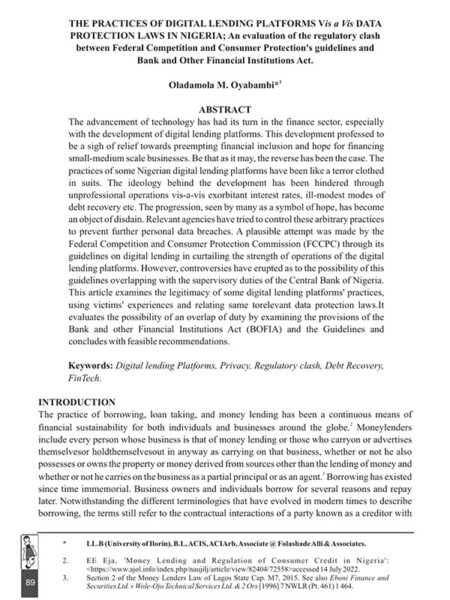
The Practices Of Digital Lending Platforms Vis A Vis Data Protection Laws In Nigeria
0₦2,500.00In his article, Practices Of Digital Lending Platforms Vis A Vis Data Protection Laws In Nigeria, Oladamola Oyabambi examines the legitimacy of the practices of some digital lending platforms, using experiences of victims and relating same with relevant data protection laws, Oyabambi evaluates the possibility of an overlap of duty by examining the provisions of the Bank and other Financial Institutions Act (BOFIA) and the Guidelines and concludes with feasible recommendations.
-
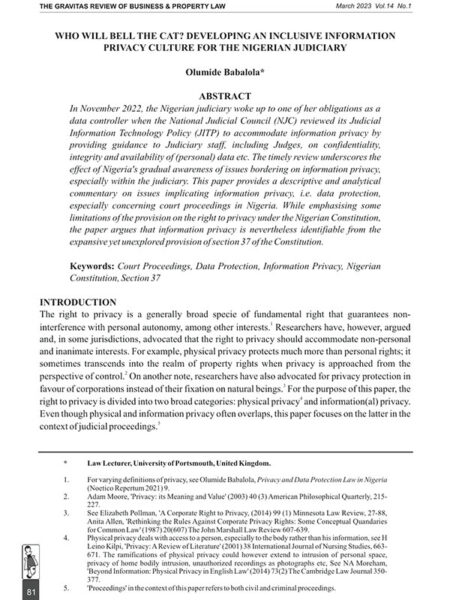
Who Will Bell the Cat? Developing an Inclusive Information Privacy Culture for the Judiciary
0₦2,500.00Olumide Babalola in his article, Who Will Bell the Cat? Developing an Inclusive Information Privacy culture for the Judiciary, provides a descriptive and analytical commentary on issues implicating information privacy i.e data protection, especially in relation to court proceedings in Nigeria. While emphasizing some limitations of the provision on the right to privacy under the Nigerian Constitution, Babalola argues that information privacy is nevertheless identifiable from the expansive yet unexplored provision of section 37 of the Constitution.
-
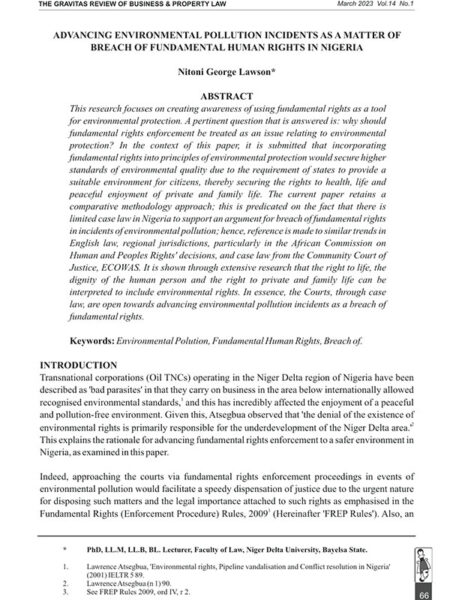
Advancing Environmental Pollution Incidents as a Matter of Breach of Fundamental Human rights in Nigeria
0₦2,500.00Nitoni George Lawson in his article, Advancing Environmental Pollution Incidents as a Matter of Breach of Fundamental Human Rights in Nigeria focuses on creating awareness on the use of fundamental rights as a tool for environmental protection. A pertinent question that is answered is: why should fundamental rights enforcement be treated as an issue relating to environmental protection? Lawson submittes that incorporating fundamental rights into principles of environmental protection would secure higher standards of environmental quality due to the requirement of states to provide a satisfactory environment for citizens, thereby, securing the rights to health, life and peaceful enjoyment of private and family life.
-
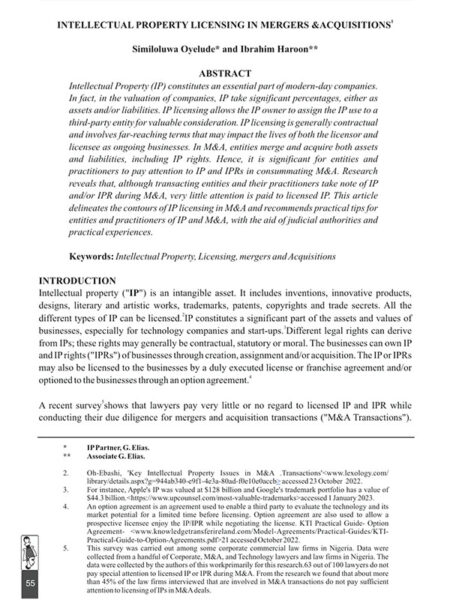
Intellectual Property Licensing in Mergers and Acquisitions
0₦2,500.00Similoluwa Oyelude and Haroon Ibrahim in his article, Intellectual Property Licensing in Mergers and Acquisitions, delineate the contours of IP licensing in M&A and recommends practical tips that are helpful for entities and practitioners of IP and M&A, with the aid of judicial authorities and practical experiences
-
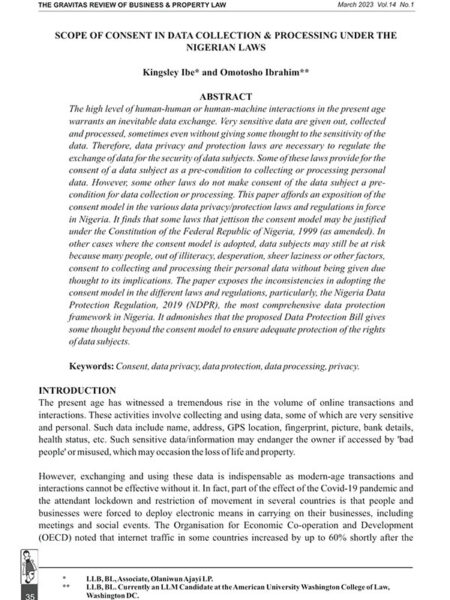
Scope of Consent in Data Collection and Processing under the Nigerian Laws
0₦2,500.00Kingsley Ibe and Omotosho Ibrahim, in their article Scope of Consent in Data Collection and Processing under the Nigerian Laws provide an exposition to the consent model in the various data privacy/protection laws and regulation in force in Nigeria. Some of the laws which jettison the consent model may be justified under the Constitution of the Federal Republic of Nigeria, 1999 (as amended). In other cases were the consent model is adopted, data subjects may still be at risk because many people, out of illiteracy, desperation, sheer laziness or other factors, consent to the collection and processing of their personal data without given due thought to its implications. Ibe and Ibrahim expose the inconsistencies in the adoption of the consent model in the different laws and regulations, particularly, the Nigeria Data Protection Regulation, 2019 (NDPR) which is the most comprehensive data protection framework in Nigeria. Ibe and Ibrahim admonish that the proposed Data Protection Bill give some thought beyond the consent model to ensure adequate protection of the rights of data subjects.
-
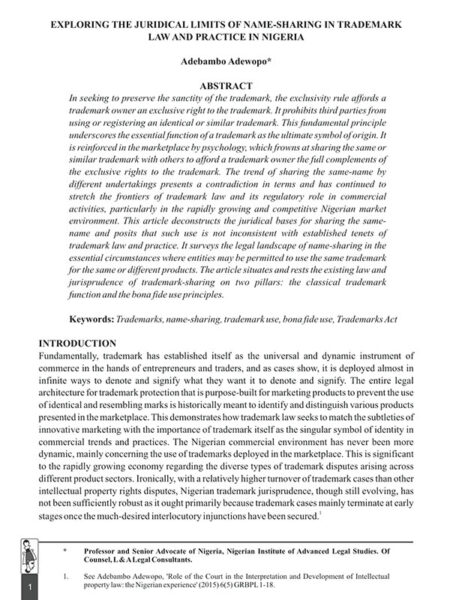
Exploring the Juridical Limits of Name Sharing in Trade Mark Law & Practice
0₦2,500.00Professor Adebambo Adewopo,in his article, Exploring the Juridical Limits of Name Sharing in Trade Mark Law & Practice explores the trend of sharing the same name by different undertakings in the rapidly growing and competitive Nigerian market environment. Prof Adewopo deconstructs the juridical bases for sharing the same name and posits that such use is not inconsistent with established tenets of trademark law and practice. Adewopo surveys the legal landscape of name-sharing in the key circumstances where entities may be permitted to use the same trademark in respect of the same or different products. The article situates and rests the existing law and jurisprudence of trademark-sharing on two pillars, namely the classical trademark function and the bona fide use principles.
-
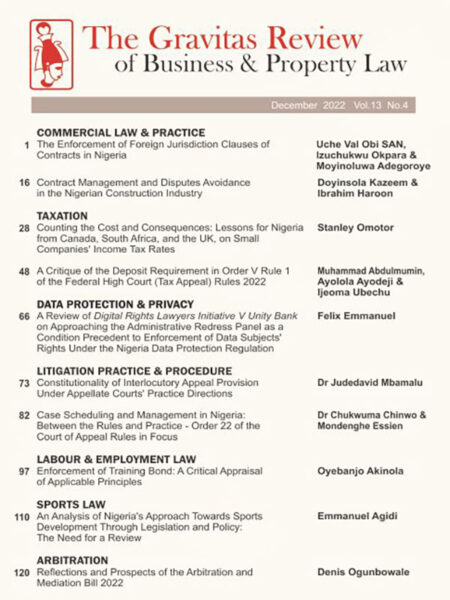
The Gravitas Review of Business & Property Law Vol.13 No.4 – Print
0₦5,000.00In this issue of The Gravitas Review of Business & Property Law Vol.13 No.4, there are well researched articles on:
- Commercial Law & Practice
- Taxation
- Data Protection & Privacy
- Litigation Practice & Procedure
- Labour & Employment Law
- Sports Law
- Arbitration
The Gravitas Review of Business & Property Law



